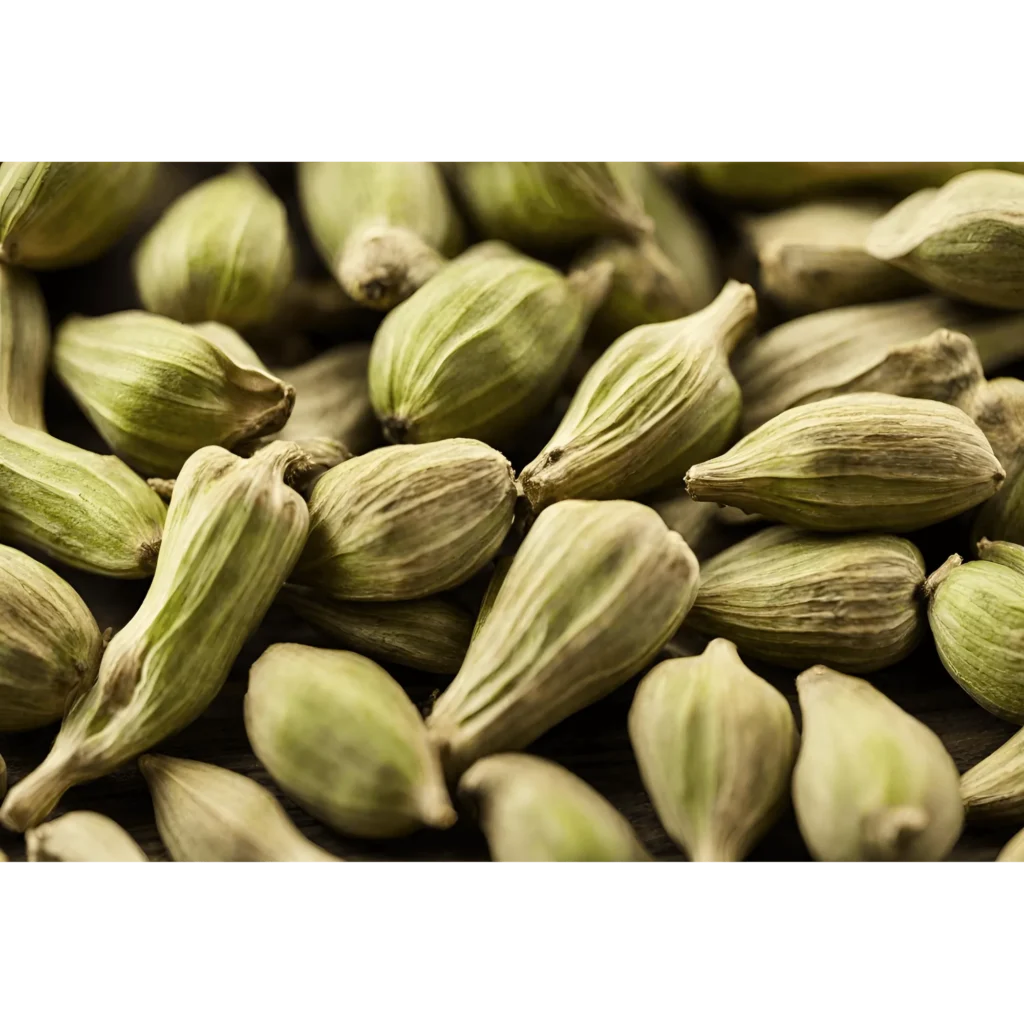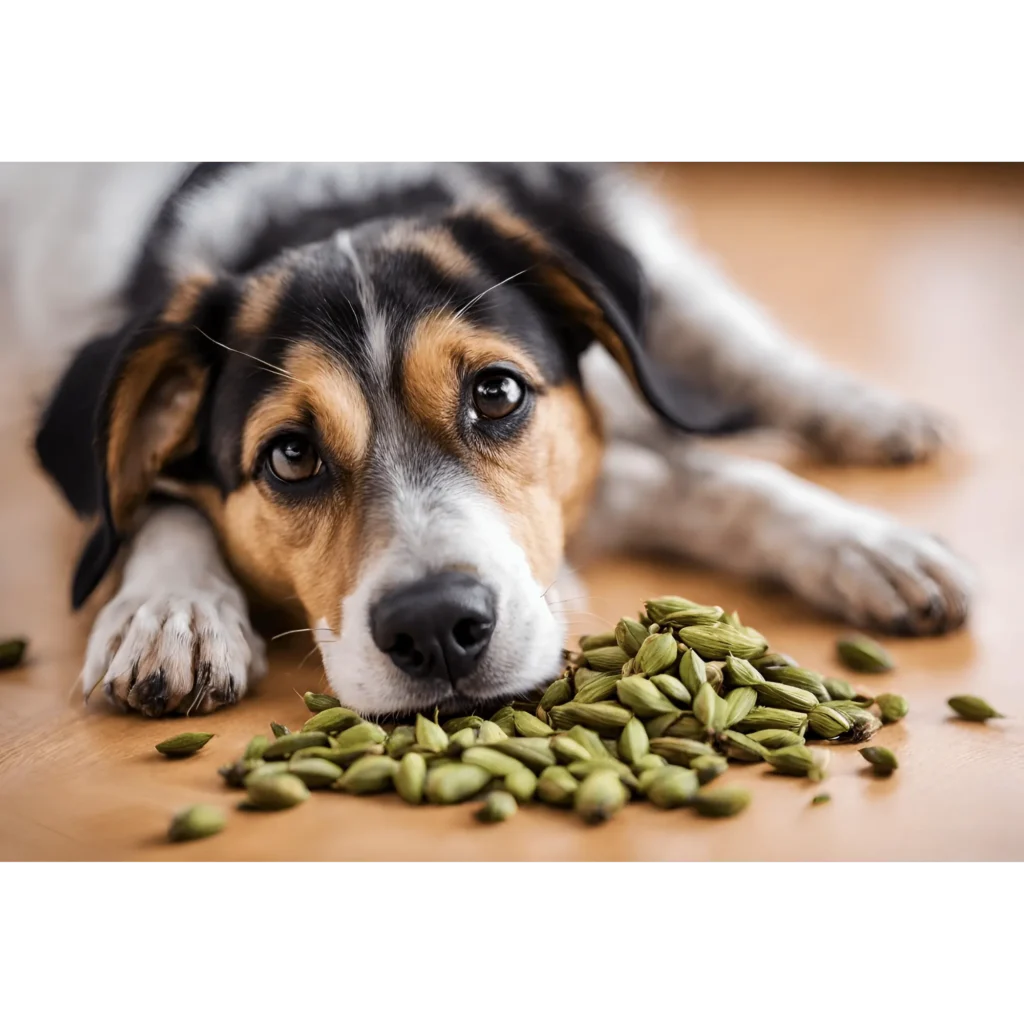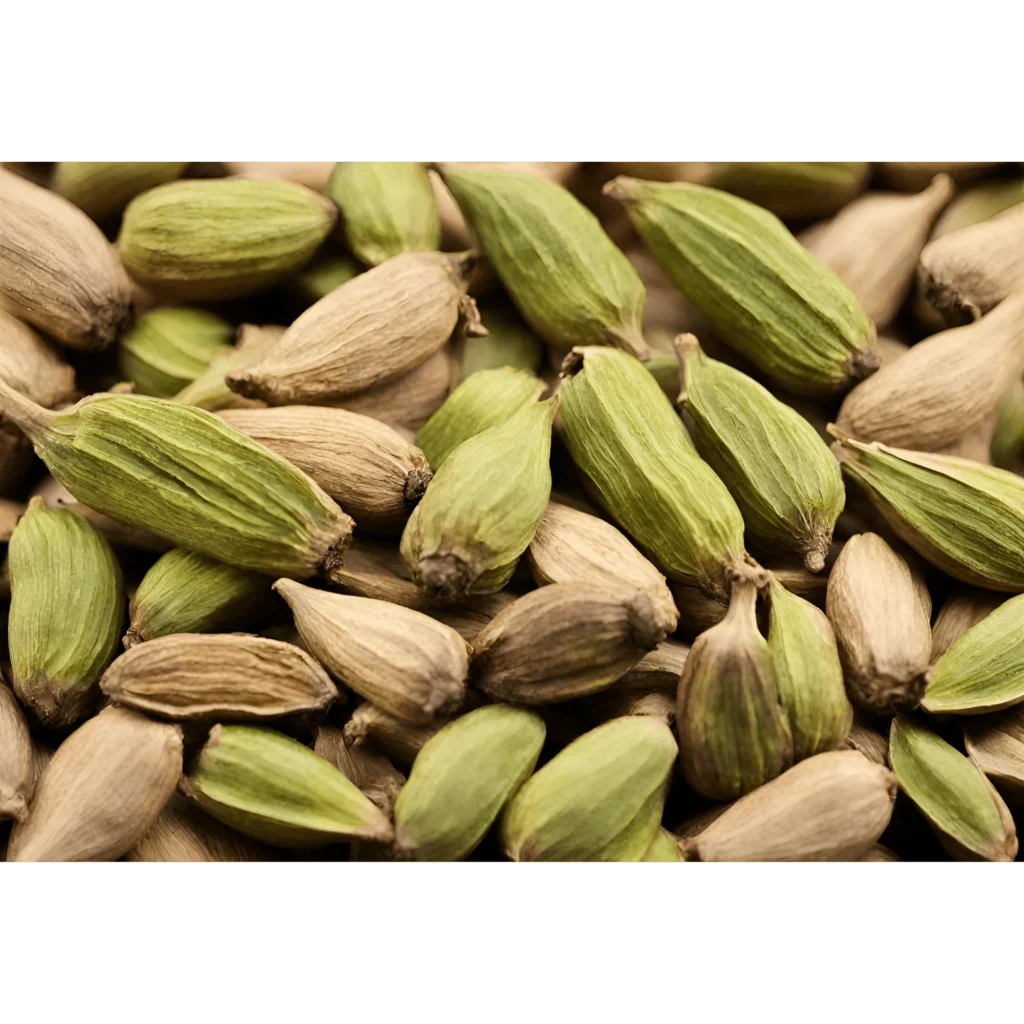Cardamom, a spice found in kitchens worldwide and popular in Asian cooking, has a rich history of use in herbal remedies for centuries. Recognized as the ‘Queen of Spices,’ cardamom not only adds delightful flavors to dishes but also boasts medicinal properties. When it comes to our furry friends, understanding their unique dietary needs is crucial. So, can dogs eat cardamom? The answer is yes; it’s safe and non-toxic for your furry friend to enjoy a bit of cardamom. However, a word of caution for pregnant dogs – it’s best to skip the cardamom, as it could pose a risk of miscarriage.
In this article, we will delve into whether dogs can safely consume cardamom. We’ll examine both the potential benefits and risks associated with feeding cardamom to your canine companions. Additionally, we’ll explore alternative spices that are safe for dogs.
Here are the topics we’re going to discuss in this blog post:
- What is cardamom?
- Is cardamom safe and healthy for dogs?
- Benefits of feeding cardamom to dogs
- How should you give your dog cardamom?
- Risks of feeding cardamom to dogs
- Why is cardamom harmful for pregnant dogs?
- What should you do if your dog eats a lot of cardamom?
- Are there other spices you can give your dogs?
What is Cardamom?

Cardamom is a spice that comes from the seeds of several plants in the genera Elettaria and Amomum, which belong to the ginger family. It is often used to add a unique taste to various dishes. There are two main types of cardamon, known as elaichi: green cardamom (Elettaria cardamomum) and black cardamom (Amomum subulatum).
Green cardamom is the more common variety and is known for its small, green pods containing tiny black seeds. It has a sweet and aromatic flavor and is often used in both sweet and savory dishes, as well as in beverages.
Black cardamom has larger pods with a smoky, earthy flavor. It is commonly used in savory dishes, particularly in Indian cuisine.
Between the two varieties, green cardamom is more commonly encountered in everyday use. This is the type you are likely to come across and potentially offer to your dog, given its widespread usage and recognition.
Is Cardamom Safe and Healthy for Dogs?

Yes, small amounts of cardamom are generally considered safe and healthy for dogs; it’s crucial to exercise caution and moderation. Cardamom contains certain compounds that may have potential health benefits, such as antioxidants and anti-inflammatory properties.
Elettaria cardamomum is a spice rich in antioxidants, playing a role in neutralizing harmful free radicals within the body and enhancing the immune system. Additionally, it is recognized for its ability to facilitate stomach movement, providing relief from discomfort associated with constipation, loose bowels, and indigestion.
Introduce cardamom to your dog’s diet in moderation. Excessive amounts can lead to digestive upsets or other adverse reactions. Fresh or ground cardamom in small quantities is generally safer than essential oils or their concentrated forms. Ensure that any cardamom added to your dog’s diet is free from additives, preservatives, and other potentially harmful substances.
Before incorporating any new food, spice, or supplement into your dog’s diet, it’s advisable to consult with a veterinarian. They can provide personalized advice based on your dog’s health, breed, and any existing medical conditions.
Benefits of Feeding Cardamom to Dogs:

Here are some potential advantages associated with feeding cardamom to dogs:
Antioxidant Properties:
Cardamom contains antioxidants, which are compounds that help neutralize harmful free radicals in the body. Free radicals are molecules with unpaired electrons that can cause damage to cells, proteins, and DNA, contributing to aging and various diseases.
Antioxidants support the immune system by neutralizing free radicals that can compromise immune function. A healthy immune system is essential for dogs to fight off infections and maintain their overall well-being. Antioxidants may assist in protecting the brain from damage and supporting cognitive function.
Anti-Inflammatory Effects:
Cardamom is believed to possess anti-inflammatory properties. Inflammation is a common factor in various joint conditions in dogs, such as arthritis. By exerting anti-inflammatory effects, cardamom may help alleviate inflammation in joints, potentially providing some relief for dogs with arthritis or other joint-related issues.
Inflammation in the gastrointestinal tract can contribute to digestive problems in dogs. Cardamom’s anti-inflammatory properties may help soothe the digestive system and alleviate issues such as gas or bloating.
Gut Health:
Cardamom has a long history of traditional use in easing digestive issues and supporting gastrointestinal health. It is thought to possess carminative properties, potentially aiding in the reduction of gas and bloating. This quality could contribute to a more comfortable digestive experience for dogs. Nevertheless, it’s important to gradually introduce new foods or spices to a dog’s diet to prevent any potential digestive upset.
Anti-Microbial Properties:
Cardamom has antimicrobial properties, which means it may have the ability to inhibit the growth of or kill microorganisms such as bacteria, fungi, and viruses. Cardamom has a pleasant aroma and is sometimes used in oral care products due to its potential antimicrobial effects. It may help combat the growth of bacteria in the mouth, contributing to improved oral hygiene and fresher breath.
Some studies suggest that cardamom may exhibit antifungal properties, which could be beneficial in preventing or addressing fungal infections. This aspect might be relevant for both oral and gastrointestinal health.
How Should You Give Your Dogs Cardamom?
Before incorporating any new food, spice, or supplement into your dog’s diet, it’s crucial to consult with your veterinarian. Start by offering a very small amount of cardamom to your dog, especially if it’s their first time trying it. This initial approach allows you to closely monitor their reaction and ensures they don’t experience any adverse effects.
One effective method to introduce cardamom to your dog is by blending it into their regular food. A small amount, like a pinch or less (adjusted based on the dog’s size), can be sprinkled onto their food. Ensure thorough mixing to enhance acceptance.
Exercise caution when giving your dog cardamom in recipes or treats that contain other ingredients harmful to dogs, such as chocolate, certain sweeteners, or other toxic foods.
Keep a vigilant eye on your dog for any signs of adverse reactions after introducing cardamom. Monitor for changes in behavior, digestive upset (vomiting or diarrhea), or allergic reactions (itching, swelling, or difficulty breathing). If you observe any concerning symptoms, promptly seek veterinary advice.
Risks of Feeding Cardamom to Dogs:

While cardamom is generally considered safe for dogs in moderation, there are potential disadvantages associated with feeding it to them. Here are some potential perils:
Allergic Reaction:
Some dogs may be allergic to cardamom, and signs of an allergic reaction may manifest as itching, redness, swelling, and skin irritation. In more severe cases, an allergic reaction can escalate to difficulty breathing, constituting a medical emergency.
Digestive symptoms, including vomiting and diarrhea, are also possible in dogs with allergies to specific foods, including spices like cardamom. If you observe any of these signs, it’s crucial to discontinue the use of cardamom and consult with a veterinarian.
Gastrointestinal Disorders:
Dogs may react differently to new foods or spices, and some individuals may be more sensitive to the compounds found in cardamom. Excessive consumption can lead to digestive issues such as vomiting, diarrhea, or abdominal discomfort.
Cardamom has a strong flavor and aroma, and introducing it in large quantities may overstimulate a dog’s senses and potentially lead to digestive discomfort.
Interaction with Medications:
Cardamom contains compounds that might have mild blood-thinning properties. If your dog is on blood-thinning medications (anticoagulants), such as warfarin, it’s advisable to consult with your veterinarian before introducing cardamom to the diet.
There is some evidence to suggest that cardamom may have a positive impact on blood sugar levels. If your dog is diabetic and is on medication to regulate blood sugar, it’s crucial to consult with your veterinarian before incorporating cardamom into the diet.
Why is Cardamom Harmful for Pregnant Dogs?

While there’s not a substantial amount of clear evidence about how cardamom affects pregnant dogs, experts generally advise against giving it to them. The FDA suggests that spices, including cardamom, might carry harmful bacteria, and in alternative medicine, cardamom is used for gynaecological issues.
Here’s the scoop: cardamom, like some other spices, might have compounds that could potentially make a dog’s uterus contract. For pregnant dogs, this could mean complications during pregnancy and even increase the risk of miscarriage. So, it’s better to play it safe and skip the cardamom to ensure both the mom and her pups stay healthy.
And it’s not just for pregnant dogs; if your furry friend is nursing, it’s best to steer clear of cardamom too, since it can pass into the milk and might not be great for the little ones.
What Should You Do If Your Dog Eats a Lot of Cardamom?

If your dog happens to ingest a significant amount of cardamom, it’s crucial to closely observe their behavior and reach out to your veterinarian for guidance. When contacting your vet, be sure to provide details on the quantity and form of cardamom ingested, as well as your dog’s size, breed, and any existing health conditions.
Excessive consumption of cardamom can lead to digestive issues and other adverse effects. Keep a vigilant eye on your dog for signs of digestive problems such as vomiting, diarrhea, lethargy, or changes in behavior, and promptly communicate these observations to your veterinarian.
Upon consultation, your veterinarian may recommend a professional evaluation, which could include tests and supportive care such as intravenous fluids or medications. It’s crucial to follow all recommendations and advice provided by your veterinarian. This may involve monitoring your dog closely at home, administering prescribed medications, or scheduling follow-up appointments as necessary.
Are There Other Spices You Can Give Your Dogs?

Absolutely! While cardamom can offer potential benefits when used appropriately, there are indeed several other spices that are safe and healthy to include in your dog’s diet. Some examples of dog-friendly spices include:
Turmeric:
Curcumin, the main active ingredient in turmeric, is known for its anti-inflammatory properties. It may help reduce inflammation, making it potentially beneficial for dogs with conditions such as arthritis.
Turmeric has antioxidant properties that can help combat free radicals in the body. Antioxidants contribute to overall health and may support the immune system.
Cinnamon:
Cinnamon contains antioxidants and anti-inflammatory properties that may be beneficial for dogs. These properties could contribute to overall health and potentially help with conditions related to inflammation.
Cinnamon may aid in digestion and help alleviate gastrointestinal issues. It can be useful for dogs with mildly upset stomachs or gas.
Ginger:
Ginger has antioxidant properties that may contribute to overall immune system health. Antioxidants play a crucial role in battling free radicals within the body.
Ginger is known for its digestive benefits and can be particularly useful for dogs with nausea, motion sickness, or mild gastrointestinal upset. It may help soothe the stomach and reduce nausea.
Parsley:
Parsley is rich in vitamins A and C, as well as other nutrients. It can provide a source of antioxidants and may contribute to overall health.
Parsley possesses diuretic properties, meaning it can potentially boost urine production. This can be beneficial for dogs with mild urinary issues. However, excessive amounts may lead to dehydration.
Basil:
Basil contains essential nutrients, including vitamins A and K, as well as antioxidants. These can contribute to your dog’s overall health. Basil has compounds with anti-inflammatory properties, which may be beneficial for dogs with inflammatory conditions.
Avoid using basil essential oil or concentrated extracts in your dog’s food, as these can be too potent and may have adverse effects. Stick to fresh or dried basil in moderation.
Always introduce new spices gradually and in small amounts. Monitor your dog for any adverse reactions, and consult with your veterinarian before making significant changes to your dog’s diet.
Conclusion:
In conclusion, while cardamom can be a safe and flavorful addition to your dog’s diet when given in moderation, it’s crucial to be mindful of potential risks and consult with your veterinarian before introducing any new spice or food. The rich history and recognized health benefits of cardamom, such as its antioxidant and anti-inflammatory properties, make it an intriguing option for enhancing your furry friend’s well-being.
However, pet owners should be cautious, especially when it comes to pregnant dogs, as cardamom may pose a risk of complications during pregnancy and potentially increase the likelihood of miscarriage. Additionally, monitoring for signs of allergies, digestive issues, or adverse reactions is essential, and any concerns should be promptly addressed with professional veterinary advice.
While Elettaria cardamomum has its merits, there are alternative spices like turmeric, cinnamon, ginger, parsley, and basil that can offer various health benefits for your dog. Always prioritize your dog’s safety and well-being by seeking guidance from a veterinary professional who can provide personalized advice based on your dog’s specific health conditions, breed, and size.
FAQs:
Can dogs eat cardamom?
While small amounts of cardamom may not be toxic to dogs, it’s generally not recommended. Dogs have sensitive digestive systems, and certain compounds in cardamom could cause stomach upset, vomiting, or diarrhea.
Are there any health benefits of cardamom for dogs?
Cardamom contains antioxidants and may have some health benefits for humans, but there is limited research on its effects on dogs. It’s safer to provide your dog with treats specifically designed for canine consumption.
Can cardamom help with a dog’s bad breath?
While cardamom has natural breath-freshening properties, it’s not recommended to use it for this purpose in dogs. Dental care for dogs should be approached with products designed for their oral health, such as dog-friendly toothpaste and dental chews.
Can cardamom help with a dog’s bad breath?
While cardamom has natural breath-freshening properties, it’s not recommended to use it for this purpose in dogs. Dental care for dogs should be approached with products designed for their oral health, such as dog-friendly toothpaste and dental chews.
Is cardamom essential oil safe for dogs?
Cardamom essential oil is potent and should never be used on or near dogs. Ingesting or inhaling concentrated essential oils can be toxic for pets. If you use essential oils in your home, ensure they are pet-safe, and consult with your veterinarian.












